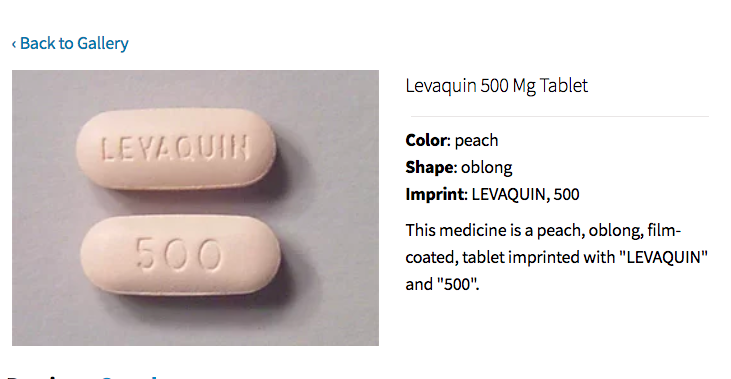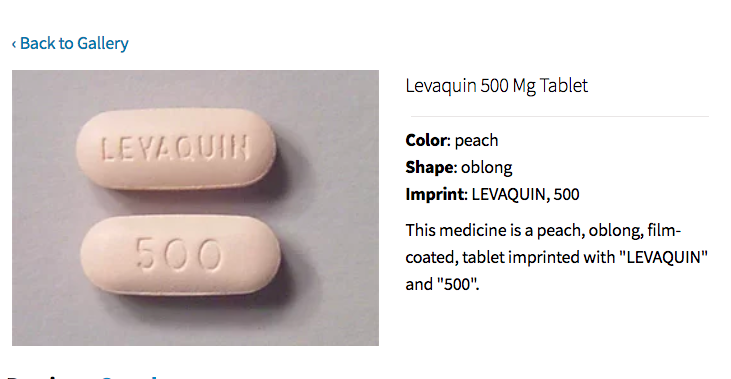
Janssen Pharmaceuticals, part of Johnson & Johnson, has stopped production of (brand-name) Levaquin, according to the article, “Drug maker stopped making popular antibiotic Levaquin amid concerns about mental health side effects” published on the Indianapolis ABC affiliate RTV6 The Indy Channel. Janssen/J&J stopped producing both oral and IV Levaquin in December, 2017. The discontinuation of Levaquin production was confirmed by a Janssen/J&J spokesperson who stated, “The decision to discontinue LEVAQUIN was made due to the wide availability of alternative treatment options, and our focus on developing innovative medicines designed to address unmet medical patient needs.” Though that statement is BS propaganda, it is a direct confirmation from a Janssen Pharmaceuticals spokesperson that JANSSEN/JOHNSON & JOHNSON HAS DISCONTINUED PRODUCTION OF LEVAQUIN.
THIS IS REALLY BIG NEWS! IT’S HUGE! WHOA!
LEVAQUIN HAS BEEN REMOVED FROM THE MARKET!
Unfortunately, there is still plenty of levofloxacin (generic Levaquin, made by hundreds or thousands of generic pharmaceutical producers) on the market, and it is maiming (and killing) thousands of people each year. The fight against these drugs is far from over.
Still, the removal of brand-name LEVAQUIN from the market is a really big deal, and it’s something that we, as a community, should celebrate.
We did this. All the people who filed complaints with the FDA, who testified before the FDA, EMA, and other regulatory agencies, who reached out to the press and told their stories, who shared their story of pain and suffering brought on by fluoroquinolones, all the people who shared articles about fluoroquinolone toxicity, all the scientists who did research showing the harm done by fluoroquinolones, all the advocates, all the people in the floxie community, and all the people who listened–we did this! We screamed loudly enough that people listened. Our efforts made a difference, and Janssen Pharmaceuticals has stopped making Levaquin.
“Never doubt that a small group of committed people can change the world. Indeed it is the only thing that ever has.”—Margaret Mead
I never thought that one of the pharmaceutical giants that has made billions from fluroquinolones would stop making them. Janssen Pharmaceuticals and J&J are huge–they are behemoths–and I never thought that we could move or effect them. But we did.
The efforts of everyone in the “floxie” community contributed to this outcome. We–you–should be proud.
That is my optimistic take on things. We all have an optimistic side. We all have a pessimistic side too, and here’s the bad news.
Janssen decided to stop making Levaquin because, a) their market share was small because generic levofloxacin is cheaper and widely available (“’Levaquin was only about 1 percent of the market share, and 99 percent was the generic,’ said Bennett.”), and b) they were facing significant lawsuits, and to avoid liability for the drugs they created, they pulled them from the market.
Victims of pharmaceuticals can’t sue drug-makers for harming them, they can only sue for “failure to warn” of the dangers of the drugs. This is ridiculous – I can sue you for hitting me in the face with a sledgehammer even if you warn me that you’re going to do it and that it’s going to hurt – but pharmaceutical companies aren’t held to the same standards as you or me. It’s assumed that their deadly products are mainly good and that warning of the potential for bad effects is sufficient to wash their hands of liability and responsibility. On top of that, they don’t even have to directly warn YOU, they only have to say that they warned your doctor, the “learned intermediary” of the dangers of the drugs (or, at least they have to in theory – it’s assumed that doctors actually know what’s on the warning labels for pharmaceuticals… but most don’t). Both the “failure to warn” notion and the “learned intermediary” notions are crap, and I hate them, but they’re how the system is set up.
Because victims of pharmaceuticals can only sue for “failure to warn” the door for them to sue is only open when the drug warning labels change. Fluoroquinolone warning labels have undergone significant changes in recent years. In reverse-chronological order, the following warning label changes have been added to fluoroquinolone labels:
- In July, 2018, fluoroquinolone warning labels were changed to note that, “Fluoroquinolone Antibiotics: FDA Requires Labeling Changes Due to Low Blood Sugar Levels and Mental Health Side Effects” – Drug Safety Communication
- In July, 2016, fluoroquinolone warning labels were changed to note that, “FDA Drug Safety Communication: FDA advises restricting fluoroquinolone antibiotic use for certain uncomplicated infections; warns about disabling side effects that can occur together” – Drug Safety Communication
- In May, 2016, fluoroquinolone warning labels were changed to note that, “FDA Drug Safety Communication: FDA updates warnings for oral and injectable fluoroquinolone antibiotics due to disabling side effects” – Drug Safety Communication
- In August, 2013, fluoroquinolone warning labels were changed to note that, “FDA Drug Safety Communication: FDA requires label changes to warn of risk for possibly permanent nerve damage from antibacterial fluoroquinolone drugs taken by mouth or by injection” – Drug Safety Communication
- In July, 2008, fluoroquinolone warning labels were changed to note that, “FDA is notifying the makers of fluoroquinolone antimicrobial drugs for systemic use of the need to add a boxed warning to the prescribing information about the increased risk of developing tendinitis and tendon rupture in patients taking fluoroquinolones and to develop a Medication Guide for patients.” – Drug Safety Communication
With each of these warning label changes, the door opened for people to sue Janssen and Johnson & Johnson for the harm that Levaquin did to them. (It should be noted that each of these warning labels changed because of advocacy done by the “floxie” community. We screamed, and, slowly, the FDA listened.) Some people did successfully sue the drug companies that hurt them–they gained some compensation and justice.
Perhaps it’s cynical, but it certainly seems more logical than the BS explanation the Janssen spokesperson gave (noted above) that the reason that Janssen Pharmaceuticals took Levaquin off the market was because they didn’t want to be held liable for the blood sugar level changes and the mental health side-effects of Levaquin. They weren’t making much money off it anyhow (because of generics taking the bulk of the market share), this warning label update opened up a new load of liability, and they did a cost-benefit analysis that led them to take it off the market.
All’s well that ends well, and they took Levaquin off the market, and that’s a good thing, right? Well, it’s more complicated than that.
Because of a stupid and asinine rule put in place by the FDA and a lousy decision of the Supreme Court, victims of generic pharmaceuticals cannot sue generic pharmaceutical manufacturers. It all goes back to the “failure to warn” rules noted above. The FDA says that only brand-name drug manufacturers can change drug warning labels, and since generic drug manufacturers can’t change the warning labels, they cannot be held responsible for what’s on the warning labels. This results in victims of generic drugs being unable to hold anyone responsible for the harm done to them by the drugs. There have been a couple cases where brand-name drug companies were held responsible for the harm done by generic drugs, but the precedent wasn’t set very solidly, and most attorneys in most states still aren’t taking cases of people who have been hurt by generic pharmaceuticals. Still, I think that Janssen and J&J saw the writing on the wall–that they could potentially be held responsible for all the Levaquin and levofloxacin-induced mental health side effects, permanently disabling side effects, permanent peripheral neuropathy, tendon tears, and more. So, they hedged their bets. Their legal team, I’m betting, will now argue that they can’t be held responsible for the harm done by levofloxacin because they don’t even make Levaquin any more, and how can they be held responsible for a product that they don’t even produce? My reply is that they can, and should, be held responsible for the drug that THEY CREATED. Johnson & Johnson created and held the patent on Levaquin for a long time. They made billions of dollars off of it. They can, and should, be held responsible for the effects of their creation. The generic drug companies should also be held responsible for the harm that their drugs do, and the FDA should be held responsible for their warning labels (and failure to warn the public about these incredibly dangerous drugs).
We pushed the FDA to change their warning labels. They did, and we should be proud of that. The warning label changes scared Janssen and J&J enough that they stopped production of Levaquin, and we should be proud of that too.
We should also be diligent about the consequences of the removal of Levaquin from the market, and we should continue to work for change in the legal/justice system so that it leans more toward justice for victims, and less toward corporate protection. It is horridly difficult for victims of pharmaceuticals to gain justice or compensation through the legal system as it is currently set up. Janssen pharmaceuticals just made a move to make it even more difficult for victims of Levaquin and levofloxacin to gain justice.
Know what they’re doing. Stay on top of them. Celebrate our victories, then come back to the battlefield fighting. As long as millions of prescriptions of levofloxacin are distributed each year, and thousands of people are maimed by the drugs, our fight isn’t over.











… [Trackback]
[…] Read More to that Topic: floxiehope.com/levaquin-production-stopped-by-jj-janssen-pharmaceuticals/ […]
… [Trackback]
[…] Information on that Topic: floxiehope.com/levaquin-production-stopped-by-jj-janssen-pharmaceuticals/ […]
… [Trackback]
[…] Find More here on that Topic: floxiehope.com/levaquin-production-stopped-by-jj-janssen-pharmaceuticals/ […]
… [Trackback]
[…] Here you can find 88320 additional Information on that Topic: floxiehope.com/levaquin-production-stopped-by-jj-janssen-pharmaceuticals/ […]
… [Trackback]
[…] Read More to that Topic: floxiehope.com/levaquin-production-stopped-by-jj-janssen-pharmaceuticals/ […]
… [Trackback]
[…] Read More Info here to that Topic: floxiehope.com/levaquin-production-stopped-by-jj-janssen-pharmaceuticals/ […]
… [Trackback]
[…] Find More Info here on that Topic: floxiehope.com/levaquin-production-stopped-by-jj-janssen-pharmaceuticals/ […]
… [Trackback]
[…] There you will find 67539 more Info on that Topic: floxiehope.com/levaquin-production-stopped-by-jj-janssen-pharmaceuticals/ […]
… [Trackback]
[…] There you will find 9115 additional Info on that Topic: floxiehope.com/levaquin-production-stopped-by-jj-janssen-pharmaceuticals/ […]
… [Trackback]
[…] Read More Information here to that Topic: floxiehope.com/levaquin-production-stopped-by-jj-janssen-pharmaceuticals/ […]
… [Trackback]
[…] Here you will find 62897 additional Information on that Topic: floxiehope.com/levaquin-production-stopped-by-jj-janssen-pharmaceuticals/ […]
… [Trackback]
[…] Read More here to that Topic: floxiehope.com/levaquin-production-stopped-by-jj-janssen-pharmaceuticals/ […]
… [Trackback]
[…] Information to that Topic: floxiehope.com/levaquin-production-stopped-by-jj-janssen-pharmaceuticals/ […]
… [Trackback]
[…] Info on that Topic: floxiehope.com/levaquin-production-stopped-by-jj-janssen-pharmaceuticals/ […]
… [Trackback]
[…] Find More Info here to that Topic: floxiehope.com/levaquin-production-stopped-by-jj-janssen-pharmaceuticals/ […]
… [Trackback]
[…] Read More Info here on that Topic: floxiehope.com/levaquin-production-stopped-by-jj-janssen-pharmaceuticals/ […]
… [Trackback]
[…] Find More to that Topic: floxiehope.com/levaquin-production-stopped-by-jj-janssen-pharmaceuticals/ […]
… [Trackback]
[…] Information on that Topic: floxiehope.com/levaquin-production-stopped-by-jj-janssen-pharmaceuticals/ […]